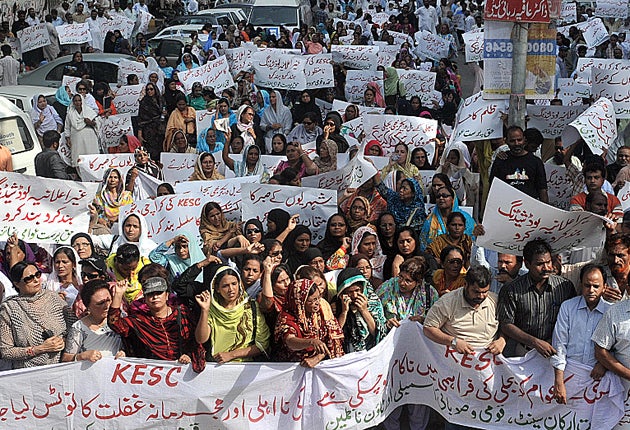Anger over power cuts hits streets of Pakistan

Your support helps us to tell the story
From reproductive rights to climate change to Big Tech, The Independent is on the ground when the story is developing. Whether it's investigating the financials of Elon Musk's pro-Trump PAC or producing our latest documentary, 'The A Word', which shines a light on the American women fighting for reproductive rights, we know how important it is to parse out the facts from the messaging.
At such a critical moment in US history, we need reporters on the ground. Your donation allows us to keep sending journalists to speak to both sides of the story.
The Independent is trusted by Americans across the entire political spectrum. And unlike many other quality news outlets, we choose not to lock Americans out of our reporting and analysis with paywalls. We believe quality journalism should be available to everyone, paid for by those who can afford it.
Your support makes all the difference.A wave of violence is sweeping Pakistan's cities and its largest province as thousands take to the streets to protest against chronic power shortages and rising fuel prices.
Offices of power supply companies have been ransacked, cars and homes torched and main roads blocked. When confronted by police, the angry crowds have replied with showers of stones. In the town of Jhang, protesters set fire to a train.
Anger spiked on Tuesday with a strike in Punjab province, home to much of Pakistan's industrial sector and most of its population, and the province where the bulk of the violence has been concentrated.
Enraged at daily power cuts that last up to 18 hours, shopkeepers shuttered their businesses in more than a dozen towns and cities, including Lahore, the provincial capital.
Meanwhile Karachi, Pakistan's largest city and financial centre, was plunged into darkness for a fourth day after heavy monsoon rains caused the central grid to fail.
Pakistan has long faced a power crisis, with electricity rationing common even in large cities, but intense summer heat and longer cuts have brought simmering discontent to a boil. With temperatures ranging from 40 to 50C, businesses struggle to operate. Only those wealthy enough to afford the fuel for private generators have been protected from the crisis.
"It's the biggest issue facing people today. Wherever one travels, there is anger," said Akbar Zaidi, an economist. "It has a knock-on effect. Without electricity, people are going out of business. The government has become the focus of the anger and, as a result, it is becoming increasingly unpopular."
The crisis has deepened economic woes. Manufacturing output has fallen by 8 per cent in the past 10 months due to the closure of factories unable to cope with power shortages.
Pakistan's textiles industry, a major source of exports, has been among the worst hit. In Faisalabad, the colonial-era town mapped out in the shape of a Union Flag, the power loom industry is on the verge of collapse.
On Tuesday, President Asif Ali Zardari summoned ministers and business leaders to hammer out responses to the crisis. Burdened by unpopularity, a souring economy and the threat of Islamist militancy, his government is vulnerable to popular anger.
Mr Zardari's ministers blame the previous government of Pervez Musharraf for failing to generate enough electricity to meet rising demand. Pakistan has the capacity to produce 20,000 megawatts but it needs an additional 4,000 to avoid power cuts.
A third of the deficit stems from the use of dilapidated equipment and theft. Under Mr Musharraf, proposed hydroelectric projects were stymied by political disputes, and political sensitivities stopped Pakistan tapping vast coal reserves in the Sindh desert.
But many also blame the current government for failing to act more quickly. "They did not fully realise the scale of the problem until they were deep into it," said Mr Zaidi.
Join our commenting forum
Join thought-provoking conversations, follow other Independent readers and see their replies
Comments